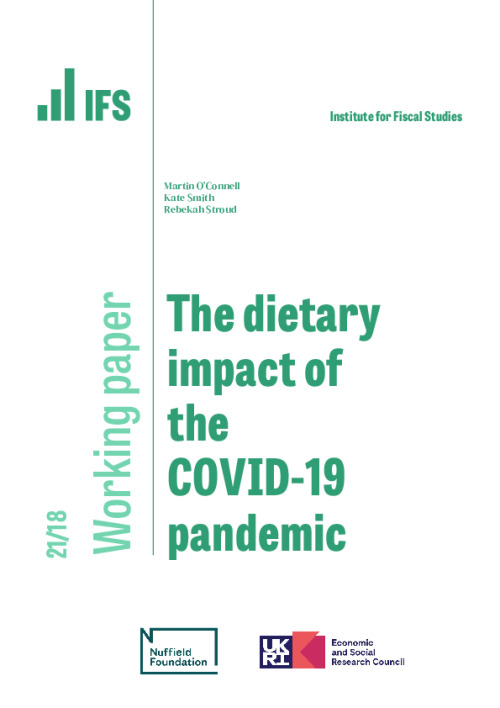Downloads

WP202118-The-dietary-impact-of-the-COVID-19-pandemic.pdf
PDF | 892.17 KB
The COVID-19 pandemic has led to significant changes in where people work, eat and socialise. We use novel data on the food and non-alcoholic drink purchases from stores, takeaways, restaurants and other outlets to quantify the impact of the pandemic on the diets of a large, representative panel of British households. We find that a substantial and persistent increase in calories consumed at home more than offset reductions in calories eaten out. By May 2020 (towards the end of the UK’s first national lockdown), total calories were, on average, 15% above normal levels, and they remained higher than normal for the rest of 2020. All socioeconomic groups increased their calorie purchases, with the largest rises for the highest SES households and the smallest for retired ones. Our findings suggest that the COVID-19 pandemic and the associated changes in people’s lifestyles have exacerbated the challenges of improving population diet and reducing obesity levels.
Authors

Research Fellow University of Wisconsin
Martin, previously Deputy Research Director, is a Research Fellow at IFS and Professor of Economics at the University of Wisconsin.

Research Fellow London School of Economics
Kate is an IFS Research Fellow and an Assistant Professor at LSE, interested in public finance, industrial organisation and applied microeconomics.

Rebekah Stroud
Working Paper details
- DOI
- 10.1920/wp.ifs.2021.1821
- Publisher
- Institute for Fiscal Studies
Suggested citation
M, O'Connell and K, Smith and R, Stroud. (2021). The dietary impact of the COVID-19 pandemic. London: Institute for Fiscal Studies. Available at: https://ifs.org.uk/publications/dietary-impact-covid-19-pandemic (accessed: 30 June 2024).
Grant
Press release
More from IFS
Understand this issue

Conservative Party Conference: Can the next government afford the NHS?

Liberal Democrat manifesto: a reaction
10 June 2024

Retirement is not always a choice that workers can afford to make
6 November 2023
Policy analysis

How do the last five years measure up on levelling up?
19 June 2024

A response to the Conservatives’ proposals to reduce growth in the health-related benefits bill
8 June 2024

Free breakfast clubs in schools: what Labour’s plans would mean for pupils and families
25 June 2024
Academic research

The role of hospital networks in individual mortality
13 May 2024

Forced displacement, mental health, and child development: Evidence from Rohingya refugees
10 May 2024
